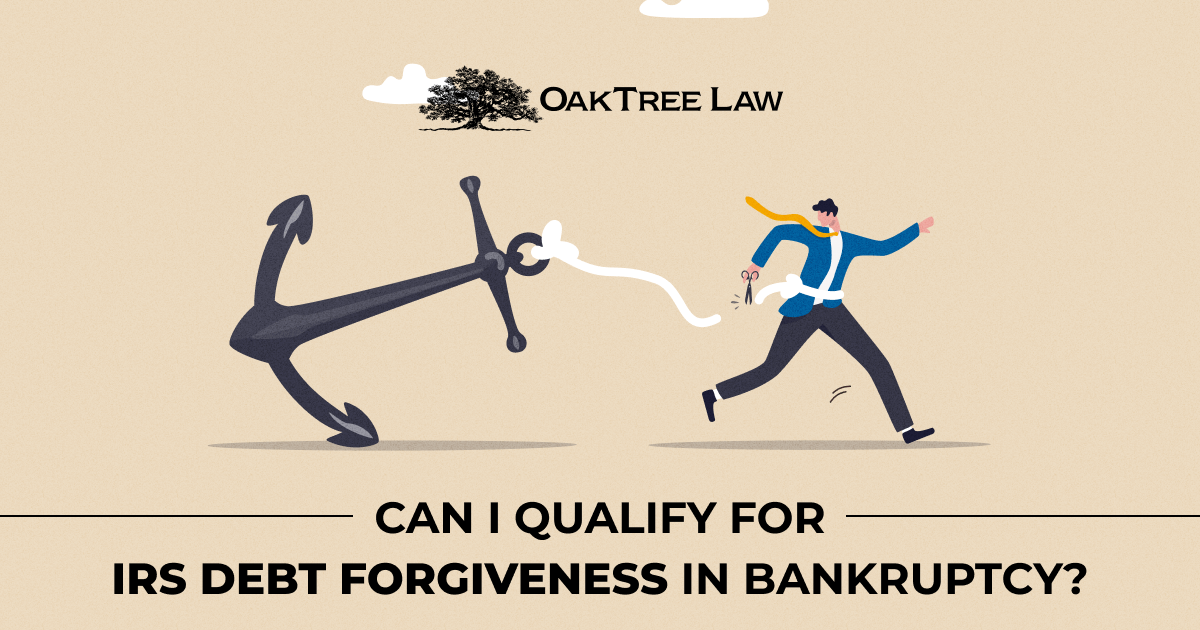
Generally, filing for bankruptcy does not eliminate tax debt. But there are circumstances in which you can have tax debt discharged. It’s important to note that bankruptcy won’t eliminate a tax lien (a legal judgment) if one is in place before your bankruptcy filing. Below, we will look at how IRS debt forgiveness can work if you file for bankruptcy.
For IRS debt to be discharged in a bankruptcy, it must meet the following qualifications:
- It must be tax debt related to federal or state income. Payroll taxes and fraud penalties cannot be eliminated.
- All your actions were lawful, and you weren’t attempting to evade paying taxes or file a fraudulent tax return.
- The taxes owed must be at least three years past due.
- A tax return must have been filed at least two years before filing for bankruptcy; a return for the tax debt in question must have been properly filed.
- The tax debt must meet the 240-day rule—the IRS must have assessed your debt 240 or more days before you file for bankruptcy; or, the debt must have not yet been assessed. (this deadline is extendable if collection efforts were previously suspended).
Discharging Unsecured Tax Debt
Priority/non-dischargeable tax debt that’s assessed within 240 days of the filing date, and for returns with a due date of within 3 years of filing for bankruptcy, can be discharged. Trust fund taxes of any age are included, as are any taxes not assessed but still assessable.
Nonpriority/non-dischargeable tax debt is that for taxes on returns not yet filed. These returns must have been filed late within two years of the filing date. There are time add-ons to consider as well, including:
- Collection Due Process Hearing: Adds 90 days to the 3-year rule and 240-day rule.
- Offer in Compromise: Adds 30 days to the 240-day rule.
- Prior Bankruptcy: If you’ve previously filed for bankruptcy, 90 days are added to the 3-year rule and 180 days are added to the 240-day rule. No additional time applies to the 2-year rule.
You can avoid having non-dischargeable taxes by letting time elapse, so your tax debt falls within time-sensitive classifications. Penalties and interest may apply. If you have non-dischargeable tax debt, the interest is non-dischargeable as well. But if the tax is dischargeable then the interest will be too.
- If your tax debt is less than 3-years old, penalties are non-dischargeable.
- If a tax debt is more than 3-years old, your penalties can be discharged.
How to Receive a Tax Debt Discharge in Chapter 7
To file for bankruptcy on a past-due tax debt, list it as priority unsecured debt in Part 1 of Schedule E/F. The trustee will review the paperwork during your trustee meeting, while the court can discharge secured and unsecured debts that meet the requirements. Discharge notifications are received within about 60 days of a court hearing. Chapter 7 bankruptcy can discharge only income tax debt, including 1040 taxes (this excludes trust fund and property taxes). The 2-year rule for filing, the 3-year rule for the age of debt, and the 240-day rule apply as well.
What Are My Options If My Tax Debt Can’t Be Forgiven?
You have various legal options if your tax debt can’t be eliminated through bankruptcy. The options include participating in the IRS’s Offer in Compromise program. It’s designed for taxpayers with little or no money and allows you to pay what you can, while the rest is forgiven. However, you’ll be forced to sell assets to the IRS, and qualifying for the program is extremely difficult.
While bankruptcy usually triggers an automatic stay that prevents creditors from pursuing debt, this is not the case with the Offer in Compromise program. The IRS may still pursue collections during the negotiation process.
Another option is to work out an installment agreement with the IRS. When you start a payment plan, wage garnishments, bank account levies, and other collections actions are typically avoided. If all else fails, you can file for bankruptcy; if your tax debt is eligible for discharge, immediate relief is possible.
Contact a Bankruptcy Attorney for Assistance
A bankruptcy lawyer can advise you on the best solutions depending on your situation. Some taxpayers who are considering bankruptcy express concern about their refund. At OakTree Law, we know every taxpayer has unique circumstances. It might be wise to delay filing until you receive your refund for the previous tax year; tax refunds are considered non-exempt property. Depending on where you live, a wildcard exemption may save your tax return, or you may have to give it up to the trustee.
Call OakTree Law
If you have excessive debt and your financial situation makes it impossible to fulfill your tax obligations, we can help. Our Los Angeles bankruptcy attorney can determine if you qualify for IRS debt forgiveness. We can also help avoid the risks of filing for bankruptcy. To request your free evaluation, contact us online or call 888-348-2609.